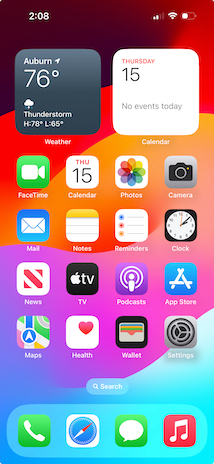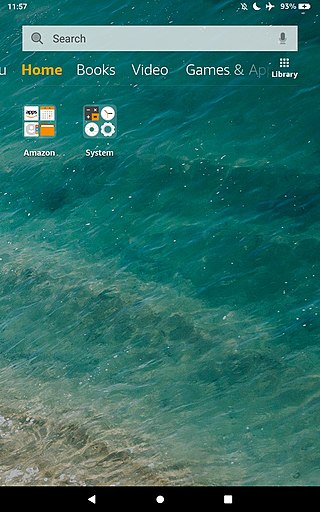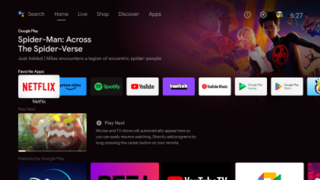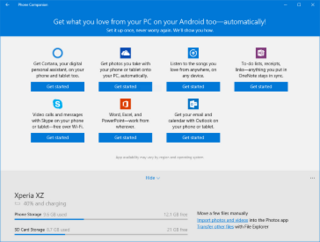Screen or Screens may refer to:
A black box is a device, object, or system whose inner workings are unknown; only the "stimuli inputs" and "output reactions" are known characteristics.

iOS is a mobile operating system developed by Apple exclusively for its smartphones. It was unveiled in January of 2007 for the first-generation iPhone, launched in June 2007.

AmigaOS is a family of proprietary native operating systems of the Amiga and AmigaOne personal computers. It was developed first by Commodore International and introduced with the launch of the first Amiga, the Amiga 1000, in 1985. Early versions of AmigaOS required the Motorola 68000 series of 16-bit and 32-bit microprocessors. Later versions were developed by Haage & Partner and then Hyperion Entertainment. A PowerPC microprocessor is required for the most recent release, AmigaOS 4.
Mobicip is a cloud-based Internet filter and parental control service that works on all major platforms of mobile Internet devices. Mobicip is supported on various types of devices used by families such as the iPhone, iPod Touch, iPad, Android, Windows, macOS and Chromebook. Mobicip was launched in 2008. Mobicip used to be a safe browser app but is now a VPN on iOS & Android that filters any browser. Mobicip is a parental control application that protects internet, regulates screentime, allows/blocks apps and tracks location as well, while allowing parents to customize the configuration and view activity reports. Using the web-based or mobile applications, parents can customize the filter to set up whitelists and blacklists, block categories of websites, and manage users and devices. In addition, the application lets parents monitor the Internet activity on the device, group the activity by user, by allowed or blocked websites, sort by time etc.

A smart TV, also known as a connected TV (CTV), is a traditional television set with integrated Internet and interactive Web 2.0 features that allow users to stream music and videos, browse the internet, and view photos. Smart TVs are a technological convergence of computers, televisions, and digital media players. Besides the traditional functions of television sets provided through traditional broadcasting media, these devices can provide access to over-the-top media services such as streaming television and internet radio, along with home networking access.

AirPlay is a proprietary wireless communication protocol stack/suite developed by Apple Inc. that allows streaming between devices of audio, video, device screens, and photos, together with related metadata. Originally implemented only in Apple's software and devices, it was called AirTunes and used for audio only. Apple has since licensed the AirPlay protocol stack as a third-party software component technology to manufacturers that build products compatible with Apple's devices.
A second screen involves the use of a computing device to provide a different viewing experience for content on another device.

Fire OS is a mobile operating system based on the Android Open Source Project (AOSP). It is developed by Amazon for their devices. Fire OS includes proprietary software, a customized user interface primarily centered on content consumption, and heavy ties to content available from Amazon's storefronts and services.

Android TV is a smart TV operating system based on Android and developed by Google. It is available on television sets, soundbars, set-top boxes and digital media players. A successor to Google TV, it features a user interface designed around content discovery and voice search, content aggregation from various media apps and services, and integration with other recent Google technologies such as Assistant, Cast, and Knowledge Graph.
ANZAC Girls is an Australian television drama series that first screened on ABC1 on 10 August 2014. The six-part series tells the rarely told true stories of the nurses serving with the Australian Army Nursing Service at Alexandria, Lemnos, and the Western Front during the First World War. The series is based on Peter Rees' book The Other ANZACs as well as diaries, letters, photographs and historical documents. The series was written by Felicity Packard and Niki Aken, produced by Screentime, and filmed in South Australia.

Phone Companion is a discontinued app advertising and file transfer utility included with Windows 10 and available for Windows 10 Mobile. It provided a partial list of Microsoft apps that are available on Android, and Windows 10 Mobile. In order to use the Phone Companion, users had to sign in with a Microsoft Account, which would sync installation progress across devices. It was replaced by the Phone Link app in the October 2018 Update, but can still be accessed on prior versions.
Screentime is an Australian television production company, which develops and produces scripted and unscripted television programs in Australia and New Zealand. The company has produced numerous popular series including Popstars, the Underbelly format, RBT and Janet King.

Google Pay is a mobile payment service developed by Google to power in-app, online, and in-person contactless purchases on mobile devices, enabling users to make payments with Android phones, tablets, or watches. Users can authenticate via a PIN, passcode, or biometrics such as 3D face scanning or fingerprint recognition.

Xbox Cloud Gaming is a cloud gaming service as part of Xbox offered by Microsoft Gaming. Initially released in beta testing in November 2019, the service later launched for subscribers of Xbox Game Pass Ultimate on September 15, 2020. Xbox Game Pass cloud gaming is provided to subscribers of Ultimate at no additional cost. Xbox Cloud Gaming operates by linking the device to a remote server in the cloud.
HarmonyOS (HMOS) is a distributed operating system developed by Huawei for smartphones, tablets, smart TVs, smart watches, personal computers and other smart devices. It has a single real-time microkernel design in kernel mode with a single framework: the operating system derives from HarmonyOS NEXT, based on OpenHarmony operating system family that is the user mode of HarmonyOS NEXT system that takes full L0-L2 source code derived from LiteOS roots that selects suitable kernels from the kernel abstraction layer. The operating system was officially launched by Huawei in August 2019.

iOS 14 is the fourteenth major release of the iOS mobile operating system developed by Apple for the iPhone and iPod touch lines. Announced at the company's Worldwide Developers Conference on June 22, 2020 as the successor to iOS 13, it was released to the public on September 16, 2020. It was succeeded by iOS 15 on September 20, 2021.

iOS 16 is the sixteenth major release of Apple's iOS mobile operating system for the iPhone. It is the successor of iOS 15, and was announced at the company's Worldwide Developers Conference (WWDC) on June 6, 2022, alongside iPadOS 16, and released on September 12, 2022. It was succeeded by iOS 17 on September 18, 2023.










